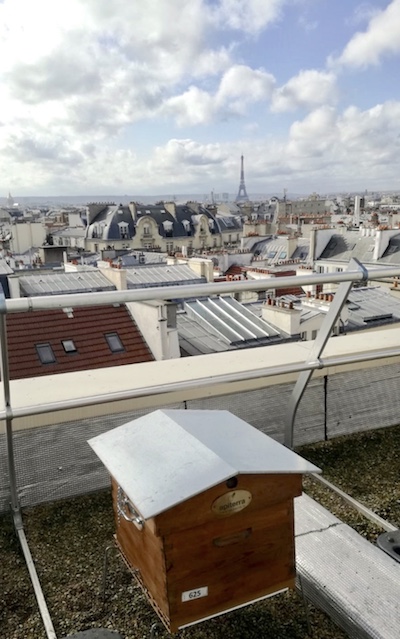New Paris rooftop beekeeping initiatives are creating a buzz in the capital.
Using the rooftops of city real estate, both business and residential, they aim to increase biodiversity and foster sustainability.
It’s another ‘green’ project where Paris is leading the way, with other global cities set to follow.
More than 2500 urban hives in Paris
The presence of bees in Paris is nothing new. Luxembourg Garden, for example, has been a honeybee haven since the 19th century, when its first apiary opened.
Even in the more urbanized parts of the city, hives have been well established for at least three decades. But in 2010, there were just 300 hives in total.
Now, there are more than 2500 registered with the city.
This recent growth is thanks to new beekeeping startups, who are installing and managing urban hives across the rooftops, on an assortment of buildings.
One company is Apiterra. They manage hives at the Paris headquarters of AXA, L’Oréal, and the Saint-Germain football club.
Another is Beeopic, whose hives are on the roofs of the Grand Palais exhibition hall, Europe's biggest bank BNP Paribas SA, and the offices of luxury goods giant LVMH. They also maintain the hives that thankfully survived the devasting fire of Notre-Dame Cathedral in 2019.
A number of restaurants such as La Tour D’Argent and the Mandarin Oriental Hotel also maintain hives, with chefs using the exclusive honey in their dishes.
How does Paris rooftop beekeeping work?
So how does Paris rooftop beekeeping work? And what are the benefits?
Companies such as Apiterra and Beeopic charge an annual fee of up to €2600 per hive ($3000). Paid for by the business or property owner, the fee includes the installation and regular upkeep of the bee colonies.
In return, the business staff or residents can enjoy jars of their ultra-local honey, branded with the company logo. Sometimes there is the opportunity to attend classes in beekeeping and biodiversity too.
Of course, there are wider benefits for the city of Paris and its environment. Maintaining the local population of honeybees helps to pollinate the urban plants and allows them to thrive.
But ultimately, it is good ‘Green PR’ for the business. In exchange for a small bit of rooftop and the annual fee, they can boost their green credentials and their environmental reputation with clients and partners.
Greenwashing concerns
Undoubtedly, Paris rooftop beekeeping is a boost for bio-diversity. But corporate-led urban beekeeping is keen to avoid ‘greenwashing.’
This is when a business may make over-inflated environmental claims about its products and policies. Simply installing a beehive is not always enough.
Another concern can also be an overpopulation of bees in such a small space, with not enough plants for the bees to forage. London, with more than 7,500 urban hives is an example.
This overcrowding can create higher competition for food between honeybees and other wild pollinators such as butterflies and bumblebees, who do not produce honey.
To counter this, companies in the French capital are being encouraged to plant pesticide-free, nectar-rich flowers. The Paris bank BNP Paribas’ real estate unit requested its landscaper plant melliferous flowers, according to reports.
The importance of bees
We all know just how important bees are to the environment. But quite astonishing is how much we rely on them for plants and food production.
In fact, bees and other pollinators are required to grow three-quarters of the plants that produce 90% of the world’s food. That means a third of all international food production depends on a healthy bee population.
This is why the bee is “the insect that is the most essential for life on the planet.”
A recent study of 880 hives in the Paris metropolitan area found that urbanization is having a positive effect on the winter survival of honeybees.
In return, Parisians can enjoy a greener city, while the green rooves ensure building owners earn credits toward sustainability certifications.
It’s another way the city environment of Paris is evolving to a greener future with innovative use of real estate.
Other recent projects like this include the adaptive reuse of office buildings, which we reported on in this blog. And also, the plans to plant trees and gardens when redeveloping the Champs-Élysées.
Here for all your real estate queries
The success of the urban hives business model in Paris is seeing it extended to other cities such as Amsterdam, Berlin, Brussels, and Frankfurt, as the hive businesses expand into other European markets.
For more interesting news stories from the French capital, you can also follow our social media channels Facebook, Twitter, Instagram, and Pinterest.
Or if you would like to contact an expert about any aspect of Paris real estate, please get in touch with the team at 56Paris.
Pics: Apiterra
